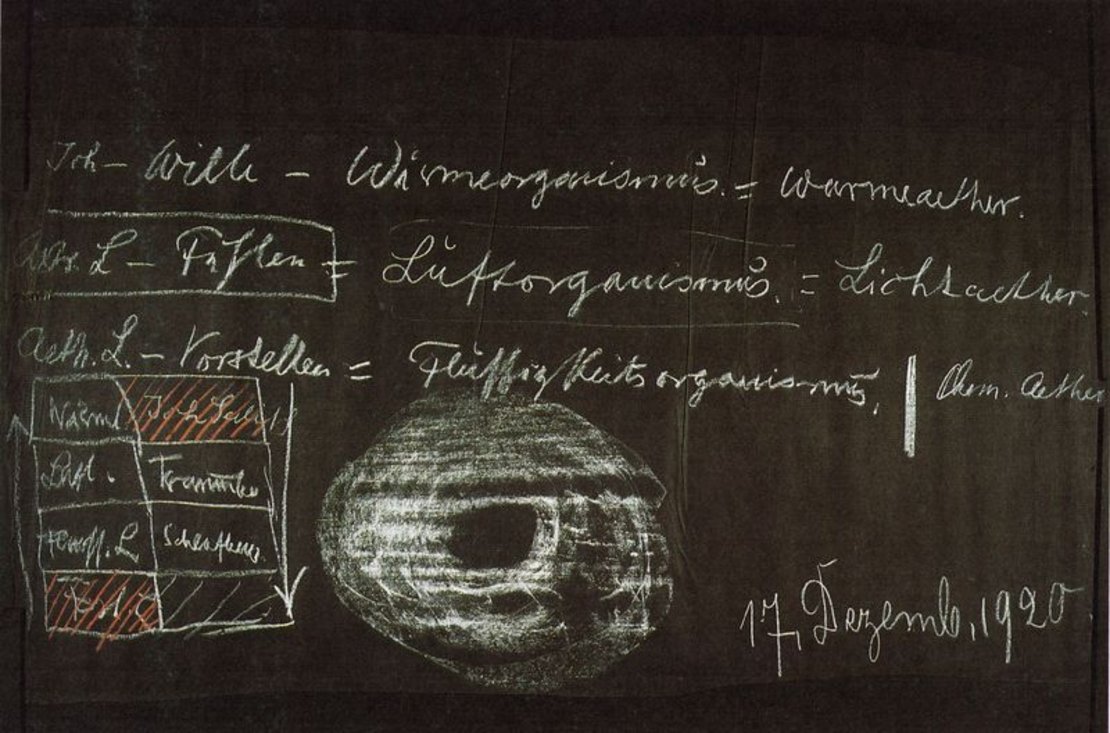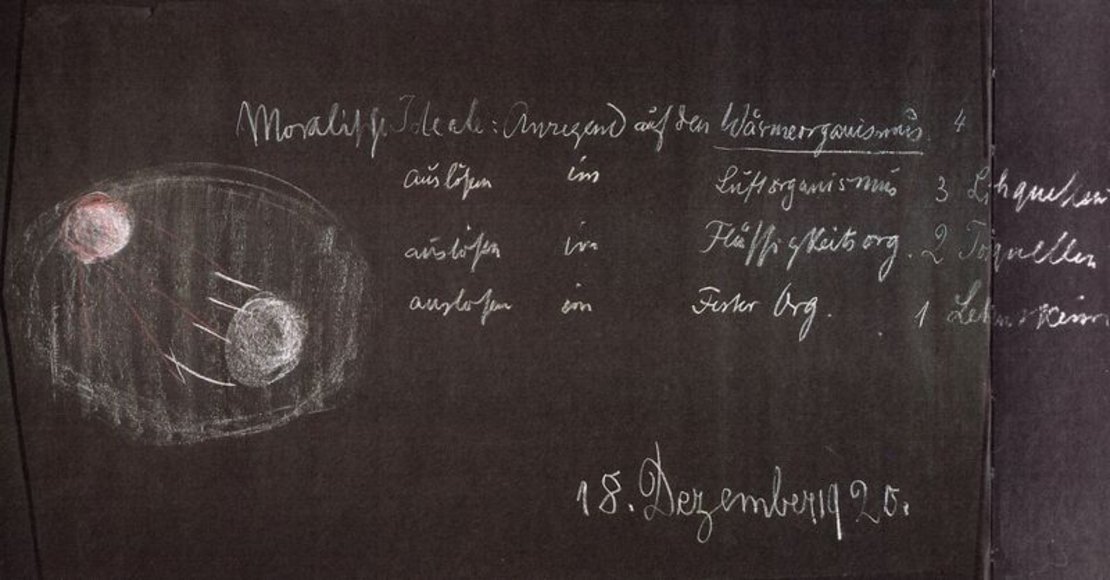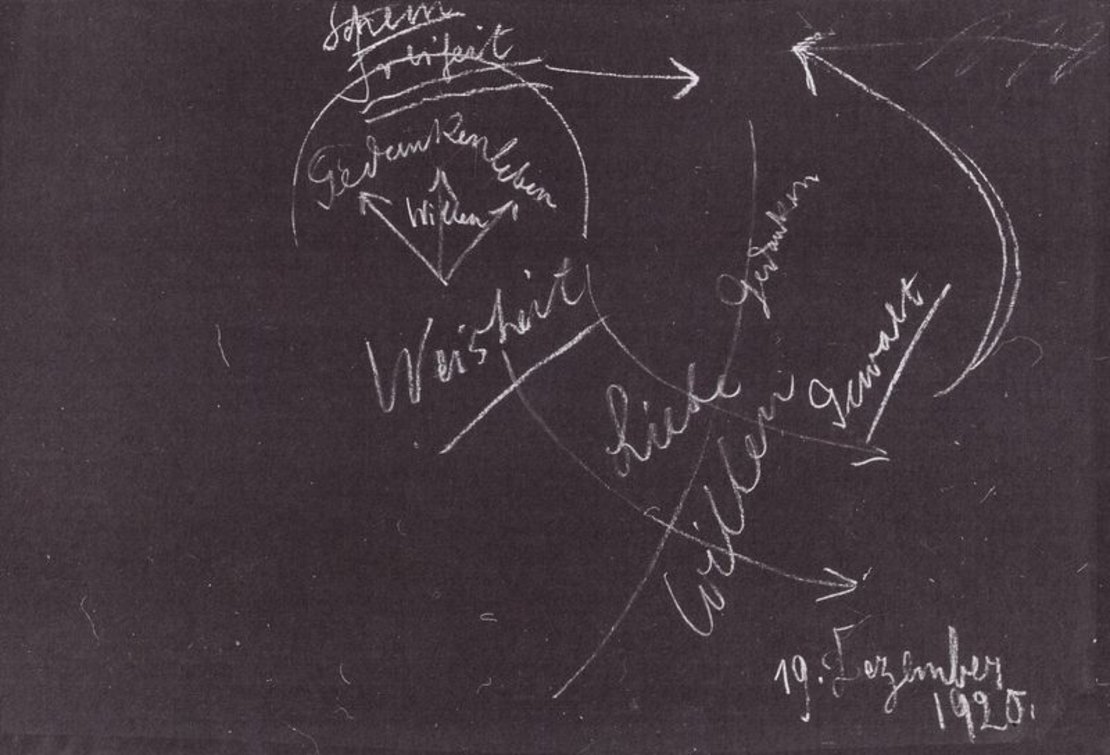How to prepare for the conference?
You can find quotations from »Brückenvorträgen« in this section. For the motif of each day, some essential passages are presented and four out of seven blackboard drawings, which were created during the »Brückenvorträgen« by Rudolf Steiner, are shown. The translation of »Brückenvorträgen« is based on:
Universal Spirituality and Human Physicality, Rudolf Steiner Press, Sussex, 2014. Translated by Matthew Barton.
Sunday: Living warmth – the four elements
Dornach, 17th of December 1920
Alongside the more or less solid human being, then, we must take account of fluids in the human organism and also the air at work in us. What we bear within us in gaseous form, as air, is a structured organism no less than the solid organism, the only difference being that it is aeriform and in movement. Then finally, the warmth we bear within us is not some kind of uniform expanse of warmth distributed through us but a subtly organized entity just as the solid, fluid and gaseous organisms are. (…)
Thus we have:
Physical organism Physical body
But seen from another perspective:
1. Solid organism Physical body
2. Fluid organism Etheric body
3. Gaseous organism Astral body
4. Warmth organism I
(…) The I is what initially activates the will in us, endows us with will impulses. How does it do so? (…)
And then we can discover, for example, how the I works in blood circulation by this means. The I acts in blood circulation via the warmth organism. Here the I acts as the entity which, we can say, sends the will down from warmth through air into fluidity. Everything in the organism is in reciprocal interaction.
Dornach, 18th of December 1920
Naturally, everything up to and including the warmth body is physical in nature. The ether body primarily engages with the fluid body, with everything in the organism that has a fluid-organizing action. The astral body engages with the air organism, and the I primarily engages with everything organized as warmth or temperature. These observations enable us to remain in the physical realm, in a sense, yet at the same time to ascend as far as the realm of spirit. (…)
Warmth exists externally and within the human organism, and the soul, the soul and spirit, can engage with our temperature organism, our differentiated bodily warmth, and thus mediate everything that we experience as our inner moral sense.
Monday: Living light -from the elements to life forces
Dornach, 17th of December 1920
Our organism contains a complete etheric organism consisting of chemical ether, warmth ether, light ether and life ether; and at the same time, quite separately, the chemical ether enters and leaves us via the fluid body.
The astral body which expresses itself in feeling, is mediated by the air organism. But now a different kind of ether has a special affinity with this air organism. The affinity between physical air expanses and the light ether pervading them was something accentuated in ancient philosophies. This light ether, which in a sense is especially borne upon the air, and really has a greater affinity with air than with tone, penetrates our air organism to a particular degree, and underlies what penetrates and withdraws from us in our air organism. Thus we have our astral body, which inwardly experiences feeling and reveals its activity particularly in the air organism and collides there especially with the light ether.
And then we come to the human I which is active via the will within the organism of warmth. This I, again, is connected with external warmth around us, with the outer warmth that enters and leaves us.
We can therefore compile the following schema:
I
- Will
- Warmth organism
- Warmth ether
Astral body
- Feeling
- Air organism
- Light ether
Ether body
- Thinking
- Fluid organism
- Chemical ether
Back to overview
Tuesday: body & soul - the four states of consciousness
Dornach, 17th of December 1920
While asleep, instead of our I – which is outside us – we have within us the spirit imbuing the wider world; which our I, although part of it, then drives away in waking life. Our warmth body is pervaded by the universal spirit. And our air organism is pervaded by what we can call universal soul, universal astrality, which we otherwise drive forth from us when we’re awake. (…)
Yet every night this whole stream of appearances is interrupted by sleep, and when we recall our life we leave this out. We forget to include the fact that our stream of memories is repeatedly interrupted by sleep. The fact that it is, means that in a sense we not only gaze upon a filled-in picture but also, albeit unconsciously, into a void. (…)
These periods of sleep are likewise contained in our recall, though not directly accessible to our awareness, since the latter orients itself only to the images remaining from our waking life. And yet this awareness of ours is inwardly strengthened by the fact that our inner field of vision, as it looks back, also contains empty spaces. It is by virtue of this that our very awareness sustains itself insofar as it is an interior one. We would lose ourselves entirely and be given up to the outer world if we never slept, if our waking life were not repeatedly interrupted by sleep. We have inner knowledge of ourselves due to dreamless sleep. (…)
In waking consciousness we perceive the world. In dreams, albeit in a dim and nebulous way, we perceive various aspects of our inner states of organic existence. And in dreamless sleep we have knowledge of our overall organism. This is a dim, dull knowledge but one which conveys our whole organism to us. (…)
Then we come to the three higher states of knowledge, imagination, inspiration and intuition which, as higher states above waking consciousness, grow ever clearer, provide us with ever clearer perceptions and knowledge. (…)
Passing from the solid body to the fluid body, the air body and the warmth body, we enter the realm of the psyche. If we pass from clear day consciousness to dream consciousness we enter the body; and enter it still more thoroughly when we know ourselves to dwell within it in the consciousness of dreamless sleep. If we trace our waking consciousness down as far as sleep consciousness, in terms of differentiated forms of consciousness we enter corporeality.
Dornach, 18th of December 1920
The dream directs us to our physical organism. In deep sleep, consciousness is very dull and dim, is more or less a zero experience for us. And yet, as I described yesterday, this zero experience is needed for us to feel the connection with our corporeality. As an I, we would not feel this connection if we did not depart from the body in sleep and then return to it again on awakening. We feel one with the body precisely because we relinquish it, feel deprived of it between falling asleep and waking up again.
Back to overview
Wednesday: the psychology of enthusiasm
Dornach, 18th of December 1920
How is morality, the moral world order, connected with the physical world order? (…)
On the one hand we have the physical world which, in this worldview, emerged by swirling from a primal soup and will return eventually to a kind of universal sludge. (…)
And when the world eventually returns to cinders and sludge, all moral ideals will end up in this vast graveyard too. (…)
What germinates in our organism as a consequence of our moral ideals and purest ideas bears no immediate fruit. The moral ideals themselves, insofar as we harbour them in our life of ideas, and feel a sense of satisfaction about our moral accomplishments – these do bear fruit in our life between birth and death. (…)
With our I we lived in our warmth organism, enlivening it with moral ideals. We lived in our air organism, where light sources were implanted which now, after death, accompany us out into the cosmos. In our fluid organism we have set in motion tone that becomes the music of the spheres we sound forth into the cosmos. And life too we bring with us out into the cosmos as we pass through the gate of death. (…)
Where lie the sources of life? They lie in what kindles the moral ideals that inspire us. (…)
We bear world-creative powers out into the cosmos, and morality is the source of these creative powers. (…)
Moral ideals - Theoretical ideas
Stimulate the warmth organism (4) Cool the warmth organism
Generate light sources in the air organism (3) Inhibit light sources
Generate tone sources in the fluid organism (2) Deaden tone
Generate life embryos (etheric) in the solid organism (1) Extinguish life
(…) If a sad age dawned across the globe when millions and millions of people passed their days devoid of spirituality – in which I included morality, which is indeed part of it – the earth would however still shine out in solar, spiritual radiance if only a dozen people still possessed lucid moral and spiritual enthusiasm. What shines out in this way only does so for a certain distance, where it is then reflected back upon itself, thus mirroring what shines out from the human being. Initiates of all ages have seen this mirroring as the sun. You see, there is nothing physical there, as I have often said. Whereas mainstream astronomy speaks of a glowing ball of gas, in fact the sun is only the seemingly physical appearance of a spiritual mirroring.
Back to overview
Thursday: the accompaniment of freedom is an illusion. Freedom – penetrating appearances
Dornach, 19th of December 1920
Between birth and death, in a sense we don’t really have any thoughts other than those which life brings us. If our experience is rich, we have a rich thought content, and poor if our experience is impoverished. The content of our thoughts is in a sense our inner destiny. (…)
Now, there is one way to become entirely free, free inwardly, and this is by excluding as far as possible the thought content that comes to us from without; increasingly shutting it out, and at the same time especially enlivening and activating the will that shines through our thoughts whenever we form judgements and draw conclusions. By doing this, our thinking acquires the quality I described as ‘pure thinking’ in my book The Philosophy of Freedom. We are thinking but only will lives in this thinking. (…)
And precisely by increasingly strengthening the will in thinking, we prepare our capacity for moral imagination, as I called it in The Philosophy of Freedom. And this reaches up to the moral intuitions which pervade and imbue our will-become-thought, or thought-become-will. By this means we raise ourselves from physical, sensory imperatives, making what is intrinsically ours shine through us, and preparing ourselves for moral intuition; and on this depends our capacity to realize every impulse from the world of spirit that we are initially capable of realizing. (…)
But what really occurs as we develop our life of thoughts? A reality becomes appearance. It is very important to be clear about this. On our shoulders we carry the head, whose ossification and tendency to it already gives us an outward picture of something dead in comparison to the rest of our fresh and more vital organism. Between birth and death we carry in our head the influx from a preceding period, when it was reality, and is now appearance; and we illumine this appearance, pervade it, with the real element from the rest of our organism, our metabolism. This represents a germination initially unfolding in our human condition, but having a cosmic significance. Picture it like this: a person is born on a certain date, and before this he was in the world of spirit. He departs from the world of spirit insofar as what was previously reality in him now becomes appearance; and into this appearance he introduces the will activity that comes towards him from a quite different direction, surfacing in him from the rest of his organism apart from the head. It is by this means that the past dying into appearance is rekindled by what shines out in the will to become the reality of the future.
Back to overview
Friday: if consciousness can’t penetrate, blind force can rule. How love can overcome that blind force.
Dornach, 19th of December 1920
The more we emerge from our organic nature and engage in activity that, in a sense, is released from this, the more we imbue our action with thinking. Sneezing is still entirely in the organic realm, and speaking too, while walking is already greatly released from this organic realm, as are the movements of our hands. We can find a gradual transition towards actions increasingly released from our organism. (..)
How - to use a contentious phrase - do we succeed in perfecting our actions? We can do this by developing within us the power that can only be described as devotion to the external world. The more our devotion to the outer world increases, the more this outer world will kindle our actions. But precisely by finding the way to devote ourselves to the outer world, we succeed in penetrating the nature of our actions with thoughts. What does it mean to be devoted to the external world? Devotion to the outer world that imbues us, that imbues our actions with thoughts, is nothing other than love. (…)
If we look at the other pole of our existence, where thoughts radiate into will nature and where we can accomplish things in love, we find that in a sense our consciousness is rebuffed by reality. Unless you resort to supersensible thinking, you cannot gaze into the realm of darkness – darkness for our awareness – where the will unfolds when you lift your arm or turn your head. (…)
Old traditions speak here of force because, while what we live in as reality is imbued with thoughts, thought is in some ways rebuffed by reality in our life between birth and death.
Back to overview
Saturday: the resurrection of matter
Dornach, 18th of December 1920
It is simply not true that substance remains constant. Substance fades away to nothing. Energy fades away to nothing in our own organism through the fact that we think theoretically.
We would not be human beings if we did not think theoretically, if the universe did not continually die in us. The dying of the universe actually endows us with self-awareness, makes us beings who can formulate thoughts about the world (…).
A past world is therefore dying in us, right down to its substance and energy. And it is only because a new one is arising simultaneously that we do not notice that substance is fading away and arising anew. In human theoretical thinking, substance is led to its end, while substantiality and universal energy are enlivened anew through our moral thinking. What is happening inside our human skin is engaged with the dying and rebirth of worlds. Here the moral and the natural order are integrated. The natural world dies in the human being and a new natural order is born in the moral sphere.
Dornach, 19th of December 1920
In our ordinary awareness we live in an element by means of which we grasp, on the one hand, what comes to expression in our will-imbued thinking, with its inclination towards freedom, and on the other where we try to increasingly penetrate with our thinking what passes into our actions. Since olden times, the connecting bridge between these two has been called wisdom. (…)
Let us understand this properly: what happens when a person raises himself to pure, or in other words will-imbued, will-illumined, thinking? Based on what appearance has dissolved – the past – a new reality develops in him, taking him towards the future, fertilized by the will rising from his ‘I’ nature. He carries this seed into the future. The soil, if you like, is formed of the real thoughts of the past; and what comes from his individuality is implanted into this soil. This seed is sent into the future, for a future life. (…)
And on the other hand, by imbuing our actions, our will nature, with thoughts, we develop what we accomplish in love. This detaches from us. You see, our actions don’t stay with us but become cosmic occurrence; and when they are filled with love then love accompanies them on their journey. (…)
This is like an unfolding plant whose blossom contains the seed that needs outer sunlight, air and so forth, needs something to come towards it from the cosmos in order for it to grow and ripen. In the same way, what is developed through freedom has to find a growth element in the love coming to meet it in actions. (…)
At one pole of human existence we find that substance is overcome, while at the other we see substance arising anew. (…)
We bear within ourselves something that gives rise to new substance: our head; and we also bear within us something that destroys substance, where we can see how substance is annihilated: our limbs, or metabolic organism.







